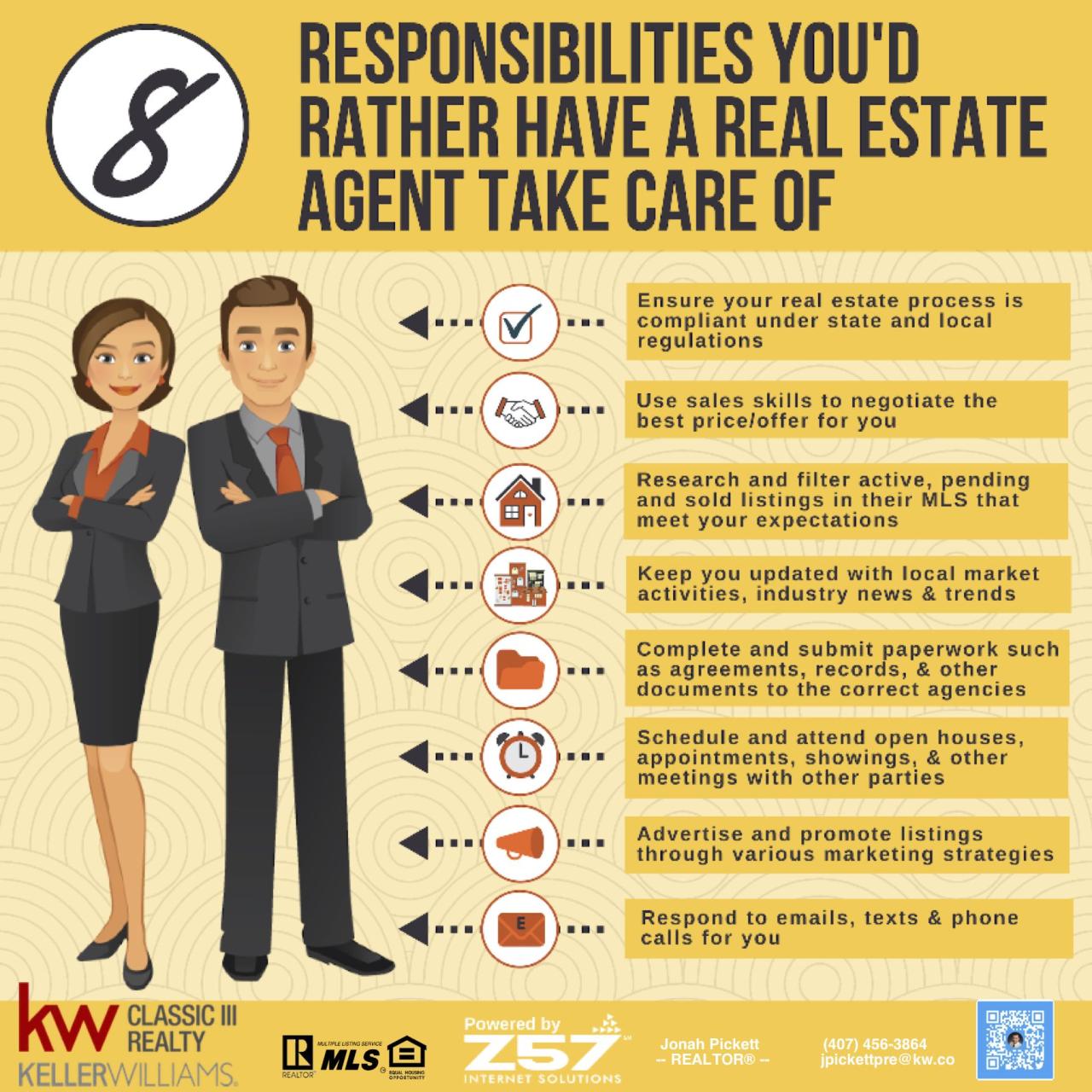Typical Duties Of A Real Estate Sales Agent: What To Expect
As the real estate industry continues to evolve, so do the duties and responsibilities of real estate sales agents. Today’s agents are expected to be more knowledgeable, skilled, and ethical than ever before. In this article, we will explore the typical duties of a real estate sales agent and what you can expect from working with one.
Real estate sales agents play a vital role in the home buying and selling process. They help buyers find the right home for their needs and budget, and they help sellers get the best possible price for their property. In addition to their traditional duties, many agents now offer a variety of additional services, such as home staging, property management, and investment advice.
Client Acquisition and Management
Acquiring and managing clients is a crucial aspect of a real estate sales agent’s role. By developing effective strategies, agents can attract potential clients, build strong relationships, and nurture leads to generate consistent business.
One key strategy for client acquisition is networking. Agents should actively participate in industry events, local community gatherings, and online forums to connect with potential clients. Social media platforms also provide a valuable opportunity to reach out to a wider audience.
Building and maintaining strong client relationships is essential for long-term success. Agents should strive to provide exceptional service, communicate effectively, and always act in the best interests of their clients. By building trust and rapport, agents can create a loyal client base that will provide referrals and repeat business.
Qualifying and Nurturing Leads
Qualifying leads is crucial to prioritize time and resources. Agents should assess potential clients’ needs, budget, and timeline to determine their suitability. This can be done through initial phone calls, meetings, or online lead generation forms.
Nurturing leads involves持续沟通 and providing valuable information to potential clients. This can be done through email campaigns, personalized updates, and invitations to exclusive events or webinars. By staying engaged with leads, agents can increase their chances of converting them into paying clients.
Market Analysis and Research
Real estate agents conduct thorough market research to stay informed about the latest trends and developments. This knowledge helps them provide valuable insights to clients and make informed decisions.
Market research involves gathering data from various sources, including:
- Online databases and real estate portals
- Government and industry reports
- Interviews with local experts and professionals
Agents analyze market trends to identify patterns and predict future market behavior. They study factors such as:
- Interest rates and economic indicators
- Supply and demand dynamics
- Population growth and demographic changes
Understanding market demographics is crucial for identifying and targeting specific market segments. Agents consider factors such as:
- Age distribution
- Income levels
- Lifestyle preferences
By combining market analysis and research, real estate agents gain a deep understanding of the market landscape. This knowledge empowers them to provide tailored advice, identify potential opportunities, and navigate the complexities of the real estate industry effectively.
Property Marketing and Advertising

Marketing and advertising are crucial aspects of a real estate sales agent’s role. To effectively promote properties and attract potential buyers, agents utilize various channels and strategies.
Creating compelling property listings is essential. Agents highlight the property’s key features, amenities, and location. They use high-quality photography and virtual tours to showcase the property’s appeal.
Social Media Marketing
Social media platforms offer a powerful avenue for reaching potential buyers. Agents create engaging content, such as property photos, videos, and market updates. They leverage social media advertising to target specific audiences based on demographics, interests, and location.
Online Advertising
Online advertising platforms, like Google AdWords and Facebook Ads, allow agents to display targeted ads to potential buyers. These ads can promote specific properties or highlight the agent’s expertise in a particular market.
Property Showings and Negotiations
Property showings and negotiations are crucial aspects of a real estate agent’s responsibilities. Agents must adhere to specific protocols during showings and possess strong negotiation skills to effectively represent their clients.
When conducting property showings, agents must obtain permission from the seller and schedule appointments in advance. They should arrive on time, dress professionally, and be prepared to provide detailed information about the property. It is essential to respect the seller’s privacy and avoid touching or rearranging personal belongings.
Negotiations
Negotiations in real estate involve both buyers and sellers. Agents must understand their clients’ objectives and work towards achieving the best possible outcome. They should be skilled in presenting offers, countering proposals, and facilitating compromise. Agents must also be aware of legal and ethical considerations, such as fair housing laws and disclosure requirements.
Closing and Post-Closing Procedures
The closing process is the final step in a real estate transaction, where the buyer and seller sign the necessary paperwork to transfer ownership of the property. The agent plays a crucial role in ensuring a smooth and successful closing.
The closing timeline typically includes the following events:
- Pre-Closing: The agent reviews the closing documents with the buyer and seller, ensuring that all parties understand the terms of the sale.
- Closing Day: The buyer and seller meet at the closing table to sign the closing documents. The agent witnesses the signatures and ensures that all funds are transferred.
- Post-Closing: The agent assists with any post-closing tasks, such as coordinating the transfer of keys and utilities.
Responsibilities of the Agent During the Post-Closing Period
After the closing, the agent’s responsibilities may include:
- Following up with the buyer and seller to ensure their satisfaction with the transaction.
- Providing referrals for home services, such as movers or contractors.
- Monitoring the property for any issues that may arise.
Legal and Ethical Responsibilities
Real estate agents have a legal and ethical obligation to act in the best interests of their clients. They must be honest, truthful, and transparent in all their dealings. They must also avoid any conflicts of interest and must not engage in any unfair or deceptive practices.
Ethical Dilemmas
Real estate agents may face a number of ethical dilemmas in their work. For example, they may be asked to represent a client who is selling a property that has a hidden defect. The agent may be aware of the defect, but they may be reluctant to disclose it to potential buyers.
This could lead to the agent violating their ethical obligation to be honest and truthful.Another ethical dilemma that real estate agents may face is the issue of dual agency. This occurs when an agent represents both the buyer and the seller in the same transaction.
This can create a conflict of interest, as the agent may be tempted to favor one party over the other.
Consequences of Violating Legal or Ethical Standards
Violating legal or ethical standards can have serious consequences for real estate agents. They may lose their license, be fined, or even face criminal charges. They may also damage their reputation and make it difficult to find new clients.
Continuing Education and Professional Development
In the dynamic and ever-changing real estate industry, continuing education and professional development are essential for agents to remain competitive and provide exceptional service to their clients. It ensures that agents stay abreast of the latest market trends, legal regulations, and best practices, enabling them to navigate the complex world of real estate with confidence and expertise.
Real estate agents can pursue professional development through various resources, including industry-recognized courses, workshops, seminars, and online platforms. These resources offer comprehensive training programs designed to enhance agents’ knowledge, skills, and abilities in various aspects of real estate, such as market analysis, negotiation techniques, legal compliance, and ethical conduct.
Industry Certifications and Designations
Obtaining industry certifications and designations is a valuable way for real estate agents to demonstrate their commitment to professional excellence and specialization. These credentials recognize agents who have met specific educational and experience requirements and have passed rigorous examinations. Some of the most recognized certifications in the real estate industry include:
- Certified Residential Specialist (CRS)
- Accredited Buyer’s Representative (ABR)
- Graduate, REALTOR® Institute (GRI)
- Certified Commercial Investment Member (CCIM)
Earning these certifications not only enhances an agent’s credibility and marketability but also provides them with a competitive edge in the industry.
Summary
If you are considering buying or selling a home, it is important to choose a real estate sales agent who is experienced, knowledgeable, and ethical. A good agent will be able to guide you through the process and help you achieve your goals.
Common Queries
What are the most important qualities of a good real estate sales agent?
The most important qualities of a good real estate sales agent include experience, knowledge, ethics, and communication skills.
What are the typical duties of a real estate sales agent?
The typical duties of a real estate sales agent include client acquisition and management, market analysis and research, property marketing and advertising, property showings and negotiations, closing and post-closing procedures, legal and ethical responsibilities, and continuing education and professional development.
How can I find a good real estate sales agent?
You can find a good real estate sales agent by asking for referrals from friends, family, or colleagues. You can also search for agents online or in local directories.









